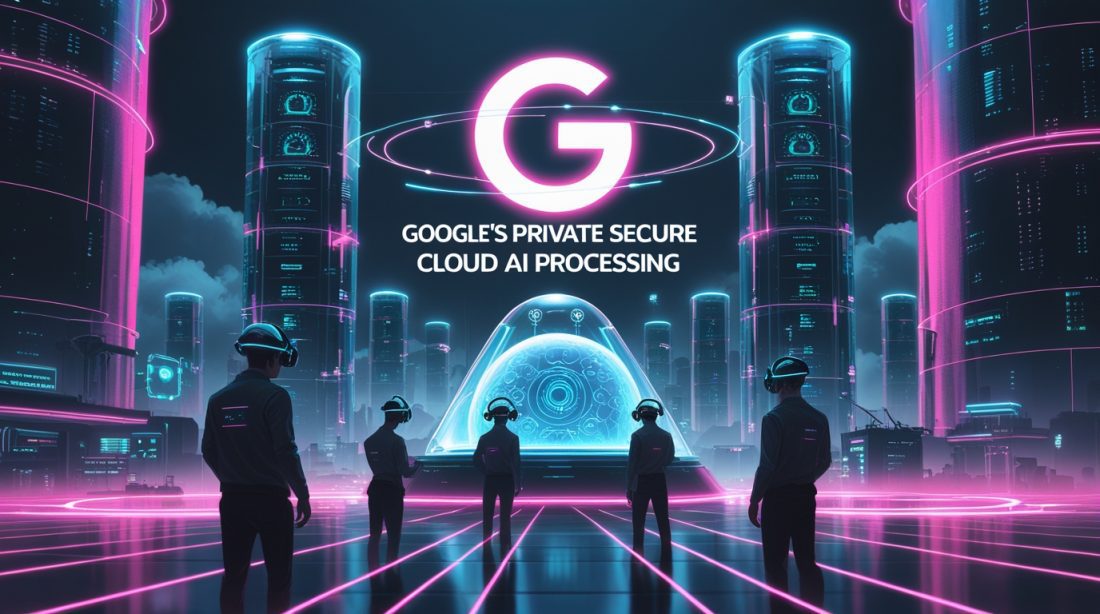Fast Facts
Google’s Private AI Compute, announced in 2025, is a new cloud-based platform designed to process sensitive data using powerful Gemini AI models while claiming security parity with on-device processing. It uses a hardened, isolated environment where even Google cannot access your data. For industrial AI, this promises to bridge a critical gap, enabling more complex, intelligent applications that handle sensitive operational data without sacrificing privacy. Initial implementations are seen in Pixel’s Magic Cue and Recorder app, signaling a hybrid future for enterprise AI.
Why Google is Betting on “Secure Cloud AI Processing”
For industrial sectors, AI’s promise has been tethered to a difficult choice: use powerful, cloud-based models and risk data exposure, or settle for the limited capabilities of on-device processing. This has stalled projects where data sensitivity is non-negotiable, such as in proprietary manufacturing processes or financial analysis.
Google’s answer, introduced in November 2025, is Private AI Compute. It’s a dedicated, secure environment in the cloud, built to process the same sensitive data typically handled on a local device. The central argument for industries is that this system is engineered to break the trade-off between AI capability and data confidentiality. As one analysis of the launch notes, this allows devices to “unlock the full speed and power of Gemini cloud models for AI experiences, while ensuring your personal data stays private to you” .
Why Security is No Longer a Binary Debate: Cloud vs. Local
The traditional local-versus-cloud debate is being reframed. Local processing offers inherent privacy and low latency but is constrained by a device’s computational limits . Cloud processing provides vast power but introduces potential vulnerabilities through data transmission and third-party access.
Private AI Compute attempts to merge these worlds. It’s built on a “multi-layered system” that includes Google’s custom Tensor Processing Units (TPUs) with hardware-based security and a “hardware-secured sealed cloud environment” . The core of the claim is that through remote attestation and encryption, data is processed in an isolated space where no one else—not even Google—has access .
Independent verification adds weight to Google’s claims. Security firm NCC Group has analyzed the system and found it meets Google’s strict privacy guidelines. This external validation is crucial for building enterprise trust.
The following table breaks down how this new model compares to the established paradigms.
Why This Matters for Industrial-Grade AI Applications
For an industrial AI analyst, the “why” is about practical impact on operations and strategy.
- Enabling Proactive Intelligence: Many industrial AI applications are evolving from simple task completion to proactive suggestion and automation. This requires reasoning over large, sensitive datasets—like global supply chain logs or real-time sensor data from a factory floor. Private AI Compute’s architecture is designed for this shift, allowing an AI to “anticipate your needs with tailored suggestions or handle tasks for you at just the right moment” using cloud-scale models without moving sensitive data into an open environment.
- Navigating Data Residency and Compliance: Industries like healthcare and finance operate under strict data sovereignty laws (e.g., GDPR, HIPAA). A system that processes data in a verifiably sealed environment, with guarantees about its geographic location, is a significant step toward compliant cloud AI. Google states that its infrastructure already offers “data residency for data stored at-rest guarantees in 23 countries” , and Private AI Compute extends this principle to active processing.
- The Hybrid Future is Here: Google is not advocating for a full shift to the cloud. Instead, they are championing a hybrid approach. Gemini Nano continues to handle simpler tasks on-device for instant response, while more complex requests are securely routed to Private AI Compute. This pragmatic split is a model for industries to follow, optimizing for both performance and security. As one report states, “We can expect to see more AI features reaching out to Google’s secure cloud soon”.
A Fictional Anecdote: Imagine a pharmaceutical company, “MediChem.” Their researchers use an AI tool to suggest new compound formulations. The data is so proprietary that until now, the AI was limited to a weaker on-device model. With a system like Private AI Compute, they could securely leverage a massive cloud model to analyze global research data, dramatically accelerating discovery while their formula remains protected in a cryptographically sealed environment.
FAQs: Answering Key Questions on Secure Cloud AI Processing
Is Private AI Compute as secure as local processing?
Google and independent analysts claim it is designed to be. The security comes from a hardware-secured, isolated environment where data is encrypted and inaccessible to anyone but the user, including Google. This is a different type of security than local processing but aims to achieve the same privacy outcome.
What are the real-world applications of this technology?
The first public examples are in Google’s Pixel 10, where Magic Cue uses it for more timely suggestions and the Recorder app uses it to summarize transcriptions in more languages. For industries, the potential spans any task requiring powerful AI on sensitive data: financial fraud modeling, confidential document analysis, and secure operational logistics planning.
How does this differ from Apple’s Private Cloud Compute?
The core concept is similar: a secure, isolated cloud environment for processing private data. The difference lies in the underlying technical implementation. Google’s system is built on its custom TPU stack and integrated with its Gemini models, while Apple uses its own silicon and models . For enterprises, the choice may come down to which ecosystem they are already invested in.
What is the “hybrid approach” to AI?
A hybrid approach intelligently splits AI tasks between a local device (for speed and basic privacy) and the cloud (for complex reasoning). This balances the low-latency and reliability of on-device processing with the power of large cloud models, and is becoming the dominant model for advanced AI.
Further Reading
- AI Cloud Ingestion Fees: 5 Alarming Reasons Small Factories Face AI Data Cost Fatigue
Explores the growing financial challenges of cloud-based AI — a perfect complement to discussions about secure cloud AI infrastructure. - AWS Outage & Robotics: How the 2025 Cloud Failure Exposed the Fragility of Global Automation
A cautionary look at what happens when the cloud fails — offering a counterpoint to Google’s promise of security and reliability. - Southeast Asia’s Surge in AI Cloud Services Growth
Shows how regional industries are rapidly adopting cloud AI, reflecting the global trend Google’s Private AI Compute is entering. - Industrial AI Creative Operating System: The Next Layer of Intelligent Automation
Examines how hybrid AI systems are reshaping industry workflows — conceptually aligned with Google’s hybrid approach to AI. - SingularityNET’s Industrial AI Marketplace Surge
Connects the rise of decentralized AI markets to enterprise-level data control — a strong thematic link to secure, privacy-first AI processing.
Subscribe to Our Industrial AI Newsletter
Stay ahead of the trends transforming manufacturing, logistics, and enterprise tech. Get monthly analysis on breakthroughs like Private AI Compute delivered to your inbox.
[Subscribe Now]

